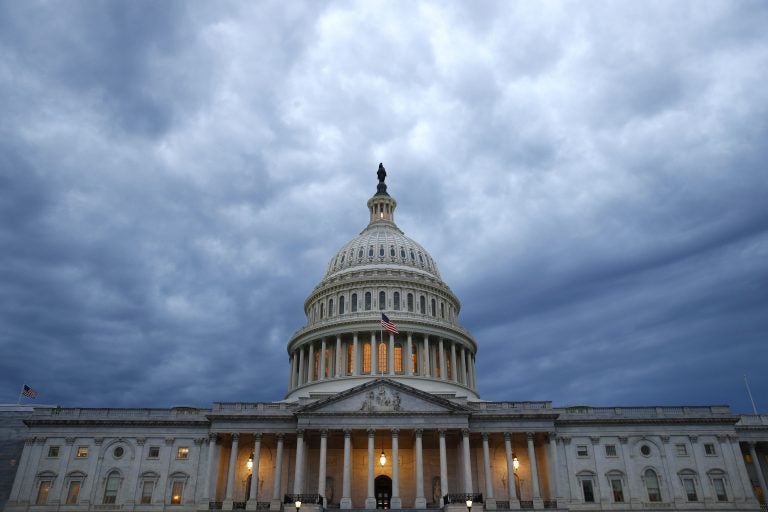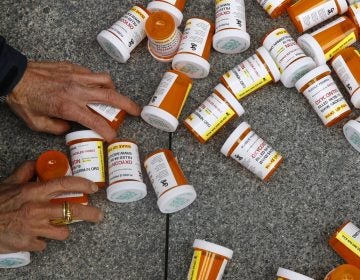Congress divided on whether to do more on opioids
Some newer members of Congress are pushing for more anti-opioid legislation, but those who passed last year’s bill are unsure more is needed.
Listen 4:55
Clouds roll over the U.S. Capitol dome on Capitol Hill, Wednesday, June 12, 2019, in Washington. (Patrick Semansky/AP Photo)
The bipartisan opioid law that President Trump signed last year aims to train medical professionals so they don’t over prescribe opioids. It also seeks to help states like Pennsylvania, New Jersey and Delaware work together so patients don’t hop across state lines to get more pills.
But there’s a divide in Congress about whether they should follow with more legislation, or let last year’s law work.
“We’ll see, we also want to see how what we’ve already passed played out before we consider new things,” said U.S. Rep. Frank Pallone, a New Jersey Democrat, who is now Chairman of the House Energy and Commerce Committee, which has jurisdiction over the crisis.
U.S. Sen. Pat Toomey of Pennsylvania, who doesn’t see eye to eye with Pallone on a lot, agrees with that approach.
“It just continues to be a really, really difficult, challenging problem,” Toomey said.
Toomey says a part of the problem facing policy makers is trying to weed through the data, such as a report this summer that showed a decrease in overdoses in Pennsylvania between 2017 and 2018.
Toomey and others question whether new policies are helping or whether efforts to provide more life saving drugs, like naloxone or Narcan, are masking the underlying problem.
“It looks like there’s at least a slight decline. Now it’s not always clear whether that’s because we have slightly less of an addiction problem, or we have a greater prevalence of Narcan. And maybe it’s a combination, so the data will hopefully shed some light on that,” Toomey said.
Last month the White House Office of National Drug Control Policy added Bucks County, Pennsylvania and Gloucester County in South Jersey to its list of areas targeted in its High Intensity Drug Trafficking Areas program. That program attempts to help facilitate coordination to “disrupt and dismantle” drug trafficking organizations.
Like Pallone, Toomey says he’s open to new legislation but is also waiting for more studies to come out in the wake of the bill they passed last year.
“Some of us are absolutely looking for other opportunities, but sometimes when a lot of new legislation gets passed it’s natural to kind of take a pause and see how that works out,” Toomey said.
That’s not good enough for many of the Democrats who were voted in last November, like U.S. Rep. Madeleine Dean from Montgomery County.
“We need to put more attention to it, but there has been legislation – they did pass something before I got here. But we are not going to rest on the issue of the opioid crisis,” Dean said.
She says Congress needs to do more to expand in-patient treatment opportunities for people struggling with addiction.
“We cannot rest. We have to think of this very differently. We have to get many more beds,” Dean said.
But she said there’s larger work to do that Congress can’t make happen through a law: changing the culture of how Americans view addiction.
“We have to do a lot more with prevention. We have to stop shaming people who are addicts. Addicts suffer from substance abuse disorder, so there’s a lot more we will do,” Dean said.
Two bipartisan task forces in the House are currently looking at how to address the opioid crisis, including one that’s co-chaired by Republican U.S. Rep. Brian Fitzpatrick of Bucks County. His office didn’t make him available for an interview on the subject, but recently he introduced a bill to expand the DEA’s power to disrupt illegal drug rings. U.S. Rep. Mary Gay Scanlon, a Democrat from Delaware County, says one problem facing federal lawmakers is that the opioid crisis is unfolding at the state and local level.
“You’ve got state and local enforcement you’ve got to deal with. Different conditions on the ground, you know, rural areas, urban areas. So we do need the grassroots input on how to address it,” Scanlon said.
While the White House is focused on building or extending a wall along the southern border, Scanlon wishes more would be done to stop the flow of drugs coming into ports such as Philadelphia’s.
“But obviously to the extent it’s coming across our borders we need to provide the kind of border security that is going to address the actual threats, as opposed to sort of fictitious ideas about people smuggling this stuff in in paper bags as, you know, they’re fleeing violence in South America,” Scanlon said.
But even as newer Democrats like Scanlon are itching to act, they’re facing an uphill battle of convincing more senior lawmakers to do more because of last year’s sweeping opioid legislation. If the new lawmakers can’t get more bills through, expect them to make Congressional in-action a campaign issue next year.
WHYY is your source for fact-based, in-depth journalism and information. As a nonprofit organization, we rely on financial support from readers like you. Please give today.




